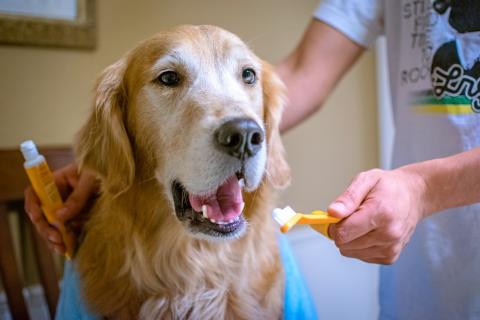
Tell the truth – when was the last time that you gave any thought to your pet’s dental health? If it has been a while, you’re not alone. When it comes to pet health, dental health often gets overlooked – not this month, though! February is Pet Dental Health Month, so now is the time to talk about the importance of proper dental care for our four-legged friends. Let’s talk about why you should pay closer attention to your pet’s dental health and how you can do that.
Dental Disease – It Could Happen to Your PetWe aren’t saying that your pet is going to get cavities if they don’t brush their teeth after each meal; however, even though cavities aren’t very likely, periodontal or gum disease is the number one illness found in both dogs and cats. That’s why it’s so important that pet owners include dental hygiene in their pet’s health and wellness routine.
Dental Disease – It Could Happen to Your Pet
We aren’t saying that your pet is going to get cavities if they don’t brush their teeth after each meal; however, even though cavities aren’t very likely, periodontal or gum disease is the number one illness found in both dogs and cats. That’s why it’s so important that pet owners include dental hygiene in their pet’s health and wellness routine.
- Dental disease can lead to all sorts of major health issues for pets.
- Issues like gum inflammation and tooth loss can not only be very painful for your pet, but can also lead to more serious conditions, including heart, lung and kidney damage.
- Studies have suggested that the majority of dogs and cats will have oral disease by the time they are three years old.
- Dental problems often develop gradually, so it can be easy to miss the signs until there is a bad infection.
- Annual check-ups with your pet’s veterinarian are crucial to recognizing the warning signs early on.
Signs and Symptoms of Dental Disease
The symptoms of dental disease can be far less obvious than with other health problems that your pet may be having, but there are some signs that you can look for. - Yellow and brown build-up of tartar along the gum line - Inflamed gums - Persistent bad breath - Sudden change in eating habits - Frequent pawing at the mouth
If you notice any of these signs or symptoms, it is important to consult with your pet’s veterinarian as soon as possible, and bring your dog or cat in for a check-up.
Tips for Improving Your Pet’s Dental Health
- Start brushing your pet’s teeth at an early age. It is important to start brushing your pet’s teeth as early as possible. The adult teeth usually come in around 6-9 months, but you can even start introducing a puppy or kitten to the use of a toothbrush even earlier. Check your pet’s oral cavity on a regular basis. It is important for you to become familiar with your pet’s oral cavity, so that you can recognize any significant changes during regular check-ups.
- Add pet-safe fruits and vegetables to your dog or cat’s diet. There are some fruits and vegetables that can naturally clean teeth, stimulate gums and freshen breath. You can slice these fruits and vegetables up and give as a treat or add to their meals. Dog-safe fruits and veggies: carrots, cucumber, celery, apples, watermelon, cilantro, and parsley. Cat-safe vegetables: broccoli, green beans, and cooked carrots.
- Clean your pet’s teeth daily. It may be challenging at first, but it is important to incorporate regular teeth cleanings into your pet’s routine. Be sure to use a toothpaste that is safe for pets, and NEVER use a toothpaste that is formulated for humans.
- Add coconut oil to your dog’s food. Bad breath odor in dogs can be reduced or even eliminated by adding a spoonful or two of organic coconut oil to their food. How? Coconut oil possesses antibacterial, antiviral and anti-fungal properties that attack bad breath and gum disease causing bacteria. The added bonus? Coconut oil is also good for improving skin and coat, and aids in digestion!
If you have been guilty of neglecting your pet’s dental hygiene, don’t be too hard on yourself – that’s what Pet Dental Health Month is all about – raising awareness and educating pet owners on how to stay on top of their pet’s oral hygiene and recognize the warning signs of a potential problem.